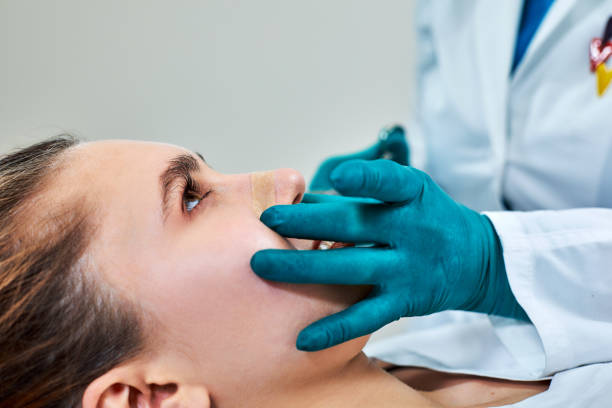Introduction
Rhinoplasty in Abu Dhabi, commonly known as a "nose job," is a popular cosmetic procedure for reshaping the nose. It’s not just a simple tweak, though; it can change your entire facial structure and, in some cases, even improve breathing. But before you dive headfirst into getting rhinoplasty in Abu Dhabi, it's crucial to understand the potential risks and complications involved.
What is Rhinoplasty?
Rhinoplasty is a surgical procedure designed to change the shape of the nose. It can involve modifying the bone, cartilage, or both to achieve a desired look. There are generally two types: cosmetic rhinoplasty, aimed at enhancing appearance, and functional rhinoplasty, which addresses breathing issues.
Why Do People in Abu Dhabi Get Rhinoplasty?
Abu Dhabi is known for its luxurious lifestyle and high standards in aesthetic beauty. People in this region often seek rhinoplasty for various reasons, such as altering a bump on the bridge, refining the nasal tip, or addressing a deviated septum. It's not just about looking good; sometimes, it’s about breathing better or fixing congenital defects.
Potential Risks of Rhinoplasty
Every surgical procedure comes with risks, and rhinoplasty is no exception. These risks include general surgical complications like excessive bleeding, infection, and adverse reactions to anesthesia. But rhinoplasty also has its unique set of risks, such as nasal asymmetry or loss of nasal structure integrity.
Common Complications After Rhinoplasty
Postoperative complications are something to watch out for. Swelling and bruising are common, and they generally subside within a few weeks. However, if they persist, it could indicate deeper issues. Scarring is another potential complication, especially if the surgical incision doesn't heal as expected. More severe complications include breathing difficulties and nasal asymmetry, where the nose doesn’t align properly after healing.
Infection Risks
Infections are a major concern after any surgery. In rhinoplasty, infections can occur due to inadequate sterilization, unclean environments, or poor postoperative care. Signs of infection include excessive redness, pus, and fever. If left unchecked, these infections can lead to more severe complications and might require additional surgery to correct.
Anesthesia Risks
Anesthesia plays a crucial role in rhinoplasty, but it’s not without risks. General anesthesia, in particular, can cause adverse reactions like nausea, dizziness, and even more severe complications like respiratory distress. It's essential to discuss anesthesia risks with your surgeon and ensure you are medically cleared for the procedure.
Nerve Damage Risks
Rhinoplasty can cause nerve damage, leading to loss of sensation in certain areas of the face. While this is often temporary, some cases could result in long-term numbness or tingling. If the nerve damage is significant, it might affect facial expressions and cause discomfort or pain.
Revision Rhinoplasty
Sometimes, the first rhinoplasty doesn’t go as planned, leading to revision procedures. Revision rhinoplasty is more complex and risky because it involves scar tissue and altered anatomy. Patients often need to wait several months for the swelling to subside before considering revision surgery.
Mitigating Risks
To reduce the risks associated with rhinoplasty, choosing a qualified surgeon is critical. Look for a surgeon with experience and a proven track record in rhinoplasty. Proper preoperative planning and consultation can also help mitigate risks by ensuring that both the patient and surgeon are on the same page regarding expectations and outcomes.
Postoperative Care and Recovery
Following postoperative instructions is crucial for a successful recovery. This includes keeping the surgical site clean, avoiding strenuous activities, and taking prescribed medications. If complications do occur, addressing them early can prevent them from becoming more serious.
Choosing a Surgeon in Abu Dhabi
When choosing a surgeon in Abu Dhabi, consider factors like experience, reputation, and patient reviews. Make sure the surgeon is board-certified and has a strong background in rhinoplasty. A reputable surgeon will also encourage open communication and provide detailed information about the procedure and its risks.
The Role of Patient Expectations
It's essential to have realistic expectations about rhinoplasty outcomes. Communicate openly with your surgeon about your goals and be prepared for a potentially lengthy recovery process. Unrealistic expectations can lead to disappointment, even if the surgery is technically successful.
Psychological Considerations
Rhinoplasty can have a profound psychological impact. Patients often experience a range of emotions, from excitement to anxiety and even disappointment if the results don't meet their expectations. Having a support system and a realistic understanding of the procedure's risks and benefits can help patients cope with these emotions.
Conclusion
Rhinoplasty can be a transformative procedure, but it's not without risks and complications. If you’re considering rhinoplasty in Abu Dhabi, it's crucial to be fully informed and weigh the risks against the potential benefits. Take your time to choose a qualified surgeon, understand the possible complications, and set realistic expectations for your recovery.
FAQs
Q1: How long does it take to recover from rhinoplasty?
Recovery varies, but most people start feeling better after a couple of weeks. Complete recovery, however, can take several months.
Q2: Can I exercise after rhinoplasty?
It's best to avoid strenuous exercise for at least a month. Consult with your surgeon for specific guidelines.
Q3: What if I don’t like my rhinoplasty results?
If you're unhappy with the results, discuss your concerns with your surgeon. Revision rhinoplasty might be an option, but it comes with additional risks.
Q4: How do I choose the right rhinoplasty surgeon in Abu Dhabi?
Look for a board-certified surgeon with experience in rhinoplasty. Check patient reviews and ask for before-and-after photos.
Q5: Is rhinoplasty covered by insurance?
Cosmetic rhinoplasty is usually not covered by insurance. However, if it’s for medical reasons like correcting a deviated septum, insurance might cover part of the cost.





Comments